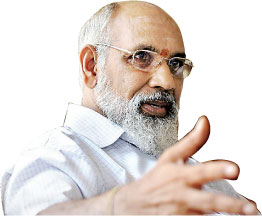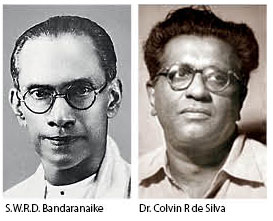Reply To:
Name - Reply Comment
 Northern Province Chief Minister C.V. Wigneswaran who has been provoking the Southern politicians and the Sinhalese people for the past few years with his extremist actions and remarks has given the Tamil students a remarkable conciliatory advice at a function in the Kokuvil Hindu Primary School in Jaffna recently. He had said that communities must learn each other’s language so that mutual understanding could be built among them and had advised the students to learn the Sinhala language.
Northern Province Chief Minister C.V. Wigneswaran who has been provoking the Southern politicians and the Sinhalese people for the past few years with his extremist actions and remarks has given the Tamil students a remarkable conciliatory advice at a function in the Kokuvil Hindu Primary School in Jaffna recently. He had said that communities must learn each other’s language so that mutual understanding could be built among them and had advised the students to learn the Sinhala language.
However, many Colombo-based media have created a negative picture about the Chief Minister’s speech based on a statement made during his speech. He had said “It is the misunderstanding among the communities that has created suspicion, ill feeling, distrust and hatred among them. We must learn each other’s languages if we want to see understanding among communities. Our people go to Norway and France and learn the languages in those countries, but disregard the Sinhala language.”
The Chief Minister had further asserted that though he had started learning Sinhala in 1955, he had discontinued doing so following the enactment of the “Sinhala Only Act” in 1956.
 “Today I am spelling out our side of the ethnic problem to the Sinhala media in Sinhala language with deficiencies. Had I continued learning Sinhala, I could have answered any Sinhala politician in his language about his concerns… Those who do not have the Sinhala knowledge might be marginalized in future. Therefore, it is vital that you improve your Sinhala language skills leaving aside politics.”
“Today I am spelling out our side of the ethnic problem to the Sinhala media in Sinhala language with deficiencies. Had I continued learning Sinhala, I could have answered any Sinhala politician in his language about his concerns… Those who do not have the Sinhala knowledge might be marginalized in future. Therefore, it is vital that you improve your Sinhala language skills leaving aside politics.”
It was unfortunate that the media failed to highlight Mr. Wigneswaran’s words about the significance of learning the Sinhala language by Tamil students, though in a Tamil nationalistic perspective. Rather, they resorted to pick his avowal about the Sinhala Only Act or the Official Language Act No. 33 of 1956, which gave provision for the Sinhala language to become the sole official language in the island.
Not merely Mr. Wigneswaran, but also many other Tamils had earlier regretted their response to the Sinhala Only Act. During a workshop for journalists conducted recently in the North, a veteran journalist pointed out that the Tamils found the public sector to be mundane subsequent to the ratification of the Sinhala Only Act. They expressed their disapproval on this concern by resigning from their service. He mentioned that many Tamils now argue that this had paved the way for more discrimination against them in the public sector.
The Sinhala Only Act was one of the main pieces of legislation that aggravated the ethnic relation in Sri Lanka. Two others were the Indian and Pakistani Residents (Citizenship) Act of 1949 which deprived the people of Indian origin of their citizenship as well as franchise and the 6th Amendment to the Constitution of 1983 which compelled Tamil parliamentarians to quit the House until 1989 in protest. The Sinhala only Act along with the Citizenship Act, “Sinhalese colonization” in the North and the East and the standardization policy in university admission were the main tools used by the Tamil armed groups in the early days of their separatist struggle in order to indoctrinate the Tamil youth.
In fact, as Mr. Wigneswaran affirmed, the Sinhala Only Act had enraged the Tamil speaking communities as it had adversely affected their lives. It was also a ridiculous law as it urged even those public sector officials serving in the Tamil dominated North and the East to show their Sinhala proficiency during appointments and promotions.
Oxford educated Prime Minister S.W.R.D. Bandaranaike who promulgated the Act was indeed not a racist, but his political ambitions pushed him to do so. He resigned from the United National Party (UNP) when he was convinced that he was not going to succeed Prime Minister D.S. Senanayake and formed the Sri Lanka Freedom Party (SLFP) in 1952. Then he had to find nationalistic slogans as he sought the backing of the newly emerged indigenous capitalist class which too was then rudderless to start a fresh journey. The Pancha Maha Balawegaya (the five great forces) which consisted of Sangha (monks) Veda (indigenous physicians), Guru (teachers) Govi (farmers) and Kamkaru (workers) and the Sinhala as the official language were two of those slogans.
Leftist leaders such as Dr. N.M. Perera and Dr. Colvin R. de Silva who had been campaigning for the two official languages Sinhala and Tamil since 1930s, foresaw the repercussion of the Sinhala Only Act, and Dr. Silva predicted during the debate on the Official Language Bill that “one language, two countries and two languages, one country” which has been oft-quoted by many after that.
 The Tamil community reacted in their own way to the Act. People like Wigneswaran not only protested against the Southern politicians who backed the new law, but also against the Sinhala language as well, by entirely rejecting it. Many Tamil officials in the public sector had resigned from the service, widening the gap between the two main communities in the country. Finally, the Act became one of the main causes for a three decade long bloody war.
The Tamil community reacted in their own way to the Act. People like Wigneswaran not only protested against the Southern politicians who backed the new law, but also against the Sinhala language as well, by entirely rejecting it. Many Tamil officials in the public sector had resigned from the service, widening the gap between the two main communities in the country. Finally, the Act became one of the main causes for a three decade long bloody war.
Interestingly, it was Dr. Colvin R de Silva whose prediction about “one language, two countries…” is still being recited by many as a mantra who drafted the first Republican Constitution of 1972 which too recognized Sinhala language as the sole official language. It was sheer opportunism and points to the nature of the country’s political culture.
The Sri Lankan government recognized Tamil language also as an official language when the Tamil youth initiated an armed struggle for the realization of Dr. Silva’s prediction and Indian government pressurized the government to do so in 1987. It was done through the 13th Amendment to the Constitution which was a direct upshot of the Indo-Lanka Accord of 1987, an accord that was imposed on Sri Lanka by former Indian Prime Minister Rajiv Gandhi.
Another interesting point is that the 13th Amendment does not state Sinhala and Tamil languages as official languages, in one clause. It says “The Official Language of Sri Lanka shall be Sinhala” in one clause and then “Tamil shall also be an official language” in another. Tamil politicians argue that this points to the reluctance of President J.R. Jayawardene and the other leaders of his government to recognize Tamil language on par with the Sinhala language.
However, this history is an attestation for the frustration of Tamil leaders many of whom like Wigneswaran had refrained from learning Sinhala. But the defeat of the LTTE on the other hand seems to have paved the way for them to realize the folly of extremism and to differentiate between Sinhala language and the Sinhalese leaders who discriminate against the Tamil language. It has taken exactly 60 years for a person like Mr. Wigneswaran who had served as a Supreme Court judge in Colombo and been acclaimed even by Sinhalese nationalistic leaders such as the late S.L. Gunasekara as a fair-minded judge, to realize that languages make people understand each other.
However, knowing each other’s language is nothing but travelling halfway towards reconciliation. For instance, there have been so many problems and clashes between the Tamil speaking Tamils and Muslims in Sri Lanka. Also, Muslims among whom many are well conversant in Sinhala language were struggling to tell their side of the story during the recent Halal controversy. Hence, it is the understanding of each other’s culture with due respect that would lead us to the destination of reconciliation.